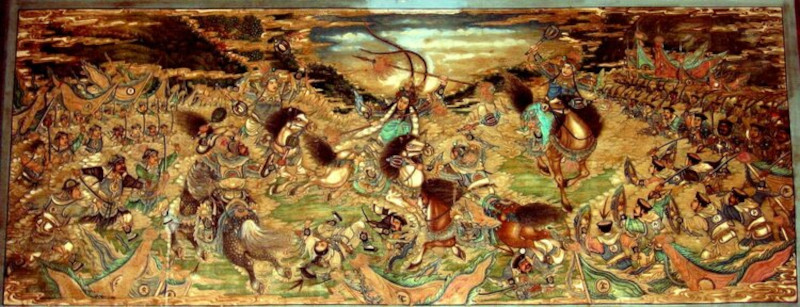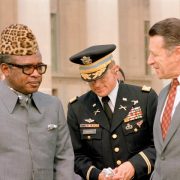Around 2007, the mood in the Western world about the People’s Republic of China (PRC), ruled by the Communist Party (CCP), was optimistic. The idea was that if China were to pass some reforms to liberalize its system and modestly democratize it, it would be admitted to the fraternity of the free world.
It was the time of the G2, the vaunted US-China political-economic cooperative that would rule the planet. It was applauded near and far, and America looked as if it was leaning toward passing China the baton in the peaceful relay race of global leadership. Nobody was really challenging Chinese borders or its claims.
Then many things went wrong, mainly China’s deep-seated misunderstanding of unspoken global rules, and now the situation is totally different. The price for a return to a peaceful and seamless coexistence with the US and the rest of the developed world has gone up for China. Nobody will be satisfied with modest liberal reforms: the first request is full-fledged democracy and the fall of Communist Party rule.
Moreover, Chinese borders, once quiet and nonviolent, are presently the stage of the largest and fastest arms race in the world, with flash points that could turn into war from India to the South China Sea to Japan and Taiwan. Now to regain peace China should make significant territorial concessions. Plus, Beijing’s rule is defied in Hong Kong, turned from a lazy financial hub into a restive center of “anti-communist sedition”; Xinjiang, home of some eight million “re-educating” Uighurs; and then the never forgotten issue of Tibet and that of Inner Mongolia.
China feels strong
Despite these challenges, China feels strong, and the country lives in a symbiotic relationship with the Communist Party, like previous dynasties before it. It’s not easy to imagine the fall of the party without entailing to a large or small extent the breakup of China as it is now. This is true also if one looks from the other side: territorial concessions would dent the CCP legitimacy and start a knotty internal process that could end up again with the fall of the PRC.
Then why should the CCP try to go down this path? From its point of view, despite international bad press, things are peachy in Beijing. It has beaten the Covid disease, still plaguing the rest of the world. Its exports are booming. It has the only economy among the large ones not to be in a recession, and it is in full recovery.
It produces more university graduates than any other country, some eight million. It is catching up fast on high tech, has defeated extreme poverty, and plans in 15 years to cover 1.3 billion Chinese with basic health care and 1 billion people with basic retirement pensions. These data could boost Chinese growth for decades. These are not election promises to be forgotten after the ballot is cast. The CCP has a history of keeping its promises, for good or bad.
It is not like in the Cold War when Soviet citizens were mesmerized and conquered when traveling in the West and had to be kept on a short leash. Chinese going abroad, the cream of the crop, are not enthused by what they see in America or Europe. People are not richer than in China, roads are dirty, many places are not safe, troubled by crime, compared to sheltered China’s life.
The much-hyped Western liberty is true for political and philosophical opinions, for which many Chinese presently may have no great passion. But many Chinese find their smaller liberties trimmed by dozens of social norms that do not exist in China – i.e., cut the grass of your garden this way or the neighbor will complain, attend a party or your colleague will hold a grudge et cetera. From this side of the road China may look freer, more secure, with a brighter future…
The US Situation
Conversely, the situation of America, seen from Beijing, is very different. President-elect Joseph Biden needs to unite America, which with his predecessor Donald Trump thrived on divisions. Biden needs to forge a new unity of the United States and will have to battle new and old trends that drive the country asunder. This will not be an easy option.
Moreover, the differences between rich and poor are short-circuiting the nation. The rich have the best education and healthcare in the world; the poor have the worst education and health care among developed nations. The US is still the most attractive place for talented people worldwide, but its schools yield just a fraction of the engineers China does.
The US won the Cold War also thanks to its capacity to factor in a huge number of elements in its clash with the USSR, and the Office of Net Assessment, at Pentagon played a pivotal role. The office conceived the race with the USSR not only militarily. It tried to evaluate the comprehensive “strength” of one country, counting its economy, science, social, religion, culture, politics et cetera. This evaluation helped to design not only military strategies but overall dynamics of development for the whole country.
Yet now possibly net assessment is not so crucial.[1]
«Net assessments are not helping shape the debate about how to affordably advance U.S. and allied security interests. The most important of these interests, as described by defense leaders, is deterring aggression by China and the PLA. There are likely several reasons net assessments of the U.S.-China competition have not emerged. Although widely described in works such as Dr. Thomas Mahnken’s excellent edited volume, Net Assessment and Military Strategy: Retrospective and Prospective Essays, net assessments lack a fixed structure, requiring analysts to formulate their own methodology using the basic building blocks of comparing competitors’ strategy and doctrine, capability trends, and underlying economic and geopolitical conditions. Net assessments are also more qualitative than analysis based on modeling and simulation or statistics, though they do include quantitative data; variables like strategy, will, geography, or alliances are hard to put into numbers. Lastly, net assessments are not fast, as years of sustained intellectual effort may be needed to understand a competitor’s point of view and decision-making processes. Perhaps the most significant challenge facing net assessments is the idiosyncratic nature of their results and recommendations. Analysts must use creativity and intuition to sort through information describing each competitor and identify asymmetries that reveal strengths, sources of national or military power, and potential vulnerabilities. The findings could be at odds with predominant thinking regarding technology investment priorities, the U.S. theory of victory, or the foundational processes that underpin how the Department of Defense spends money. And the resulting recommendations will likely require choices that gore some sacred cows», argue the authors of the essay Bryan Clark, Dan Patt, and Timothy A. Walton.
They call for creativity in facing China and say in their appeal, «effectively competing against China with a sustainable military may require creative strategies that leverage American strengths such as alliances, financial systems, and operational adaptation to overcome inexorable shortfalls like being the away team in most potential confrontations. Net assessments can help reveal opportunities for strategies of this kind and – most importantly – establish priorities for limited federal budget dollars».
With these assessments of the US and the assessments of China, the Chinese may feel they are winning and it is no use to change its strategy.
Here there are of course several issues. Is the assessment of Chinese strength actually right?
Yet, even if it is right for China to challenge the whole world, it is a big endeavor. Before World War I, Germany was the center of world innovation in culture and science. Modern physics, mathematics, literature, and philosophy were all born and groomed in Germany and Austria-Hungary, which boasted the best educated youngsters, but also the freest social and political atmosphere of the time.
China doesn’t have that and like Germany is surrounded by countries growing more hostile and more coordinated. Then is China’s strength all real or it is just some kind of optical illusion?

The Battle of Zhuxian County inside the Long Corridor on the grounds of the Summer Palace, constructed during the Qing Dynasty, in Beijing, China. (Wikimedia)
Machiavelli and Hanfei zi
This growing external hostility rests on many controversial issues with China, but two stand out:
First, the western world believes that murky Chinese politics and a murky market can’t work for the whole world. Murky Chinese politics and a murky market sway and pollute the whole global economy, and therefore, they have to become more transparent.
Second, perceived or real aggressive Chinese military actions on territorial disputes scare everybody into America’s arms. Even if the US didn’t want to care, as the US is porous by its nature to interests from the whole world, the US will care if one or many Asian countries complain about China.
China may complain that it wants to reform politics, but at its own pace, and that it was never confrontational with its neighbors, its neighbors were aggressive with her. Still, politics is not a matter of goodwill or bad intentions, but of practical necessity in a given time. Can world set its watch on Chinese timing of internal reforms? It’s unlikely, because that would change the global economy. Neither is much use to try to turn the blame of aggression on to others, as at the end the whole discourse has become one of national interests, China doesn’t propose a broader international vision that goes beyond its own securities and will take care of other countries concerns. Then each country will defend its own specific interests.
So, what should China do? If it is confrontational, it’ll make matters worse. If it gives in, the situation, as we saw, could fall apart.
In theory, it can only preempt these allegations and try to create a different perception of itself. The world of 2007 is gone, but in theory something else could be achieved and the external perception of China could change.
Here perhaps before thinking about what China could and should do, it could be time to consider beginning a deeper cultural revolution for China.
In the liberal West the cynical political realism of Machiavelli is considered the extreme example: even if it is used, it is not admitted, and personal freedom and the pursuit of happiness are considered fundamental rights of the individual within the state, something that harks back to the democracy and republic of the Greek and Roman states based on association of free citizens in Athens and Rome. Before those necessities, the state’s interests have to bow. Machiavelli’s state logic in theory can be accommodated as long as the accommodation is not too costly and doesn’t spill into Hobbes’s Leviathan, considered the perversion of the free state.
In China Machiavelli’s thinking was predated in the third century BC by Hanfei Zi’s legalistic theories. Yet Hanfei Zi, unlike Machiavelli, is not the exception in political thinking. He was the culmination of centuries of debates trying to make the state, built around the pivotal character of the king and his bureaucracy, grow stronger to survive the wars of annihilation that had been raging in the Yellow River basin for half a millennium.
The survival of the state was the prize, and thus the wellbeing of its citizens, not the freedom or happiness of the people. Even when Hanfei Zi’s theories became masked under a Confucian veil, it encouraged the rulers to be kind and attentive to their subjects and their needs, and it authorized the subjects to rebel if their needs were not attended, i.e. if they were starving. “Confucianism” didn’t entitle the subjects to freedom or happiness.
In China, traditionally, freedom and happiness are temporary moments, during feasts or celebrations, or are the preserve of the two extremes of society: the emperor or the hermit, the one who has it all and the one who gives up everything.
In all of this, morality is also shaped differently. As the state and its bureaucracy are pervasive and ever efficient, the individual is freed from moral obligations to his fellow citizens. In general, there is moral behavior only toward a fellow of his own social group or family: I help out my weak cousin when crossing the street, this is expected, but if I see a nobody in the street having difficulties, I can be expected to turn away from him and mind my own business.
At the same time, in the Confucian-veiled legalistic theories, political cruelty is supposed to be standardized, applied with humanity and attention, graded according to differences among people, and thus it should become not absolute and arbitrary, but humane, and thus tolerable. In the West, as the law in theory needs to uphold individual rights, when it becomes harsh, it is inhumane and it is perceived as absolute, and thus intolerable.
Different Militaries
Yet before the final victory of Legalism, utter cynical realism, Chinese mainstream tradition was not always like that. John Sullivan argues[2] that not all military generals are like Sunzi, looking for the sheer annihilation of the enemy. For instance, Wu Zhonghang, a general in the state of Jin tasked with conquering the city of Gu in 527 BCE, preferred to win the population over rather than destroying it, which was easier and faster.
In fact, there is a whole ancient Chinese military tradition whose stress was not on fast victory but on building a virtuous state that would enable strategic success.
For instance, Wei Liao Zi (about 4th century BC) in his War Awe 戰威 argues that
«If the state must have rituals of property, be trustworthy, caring, honor in being affectionate then it will make hunger easily disappear. If the state has filial piety, brotherly love, honesty, and sense of shame, then life will overcome death. The ancient in leading the common people, first put propriety and trustworthiness before titles and rewards, first put honesty and sense of shame and then punishments and penalties, first put caring and affection and then disciplining people».
故國必有禮、信、親、愛之義,則可以飢易飽;國必有孝、慈、廉、恥之俗,則可以死易生。古者率民必先禮信而後爵祿,先廉恥而後刑罰,先親愛而後律其身
Or Wuzi in Plotting the State 國圖, says:
«In giving a system to the state and ruling the army one must teach them according to rules of propriety, and encourage them according to honor, with this they will have a sense of shame. Once the good people have a sense of shame, in great manners this will suffice to go to war. In small matters it will be enough for defense, then victory in war will be easy and defense will be difficult to be overrun. Therefore, we say, in wars in the Under Heaven, the ones who have five victories have a disaster, the ones with four victories are a calamity, the ones with three victories are hegemons, two victories make a king, and one victory makes the emperor. This is because many victories reduce the population of the Under Heaven and create huge losses».
吳子曰:「凡制國治軍,必教之以禮,勵之以義,使有恥也。夫人有恥,在大足以戰,在小足以守矣。然戰勝易,守勝難。故曰:天下戰國,五勝者禍,四勝者弊,三勝者霸,二勝者王,一勝者帝。是以數勝得天下者稀,以亡者眾。」
Then strong, virtuous states produce strong, determined soldiers that can win all wars. But around the 5th or 4th century BC apparently there was a massive deviation in favor of total, fast victory. Before that, for instance, in his Fei Gong 非攻 chapters Mozi opposed attack with massively superior forces (gong 攻), something that Sunzi approved of. The Mohists, representing smaller, older states, favored an order in which each state respected one another and the Son of Heaven, a semi-religious arbiter, intervened to solve conflicting claims. Sunzi conversely was for a system where large states settled scores on their own by use of overwhelming force.
Possibly, it was because at the time a bureaucratic revolution took place. Some states became better organized, with a more efficient agricultural production and able to field more and better-fed troops. And the system was that peasants could serve as soldiers and vice versa, as clearly stated by Shangjun in the Agriculture and War chapter, Nong Zhan 農戰.
They had a greater net power, including a claim to superior “theory,” that translated into greater military might. Bureaucracy and land administration are true Chinese contributions to statecraft, just as democracy and the republic was for the ancient Greeks and ancient Romans.
These states with better administration produced larger, stronger, and more efficient populations. The stranglehold of the necessity of winning over more people of different cities and states to gain more power was simply no longer true.
It might have become more practical to mie guo 灭国, annihilate states (kill all the military age men and adopt and marry off children and women). The practice was ancient, and used as extreme punishment by the Son of Heaven for particularly evil cities. But possibly later on it was used without the necessity of eradicating evil, but just for political expansion.
However, presently the Sunzi model of annihilation of the enemy is impossible and if adopted, in case of defeat, it could lead to the annihilation of China. Moreover, shutting China out of the Western-dominated world could also lead down to the path of slow self-destruction, like that of North Korea.
The only way for China is to win over “the enemies” as Wu Zhonghang did. Now “rules of propriety” are different than 25 centuries ago and Beijing should think long and hard about how to deal with this.
A similar challenge is up for Biden’s America. If the US doesn’t present to the Chinese a viable and more comprehensively attractive alternative to the CCP rule, the confrontation could become long and very bitter.
[1] «The Department of Defense Needs to Relearn the (Almost) Lost Art of Net Assessment», Strategy Bridge, November 19, 2020.
[2] «Siege Mentality: A Tale of Two Wus», Strategy Bridge, November 10, 2020






@Francesco Sisci “China’s deep-seated misunderstanding of unspoken global rules” – What are the unspoken global rules? How should China have understood the rules if they’re unspoken?
Fascinating article from Francesco, your insights are invaluable….Bravo!